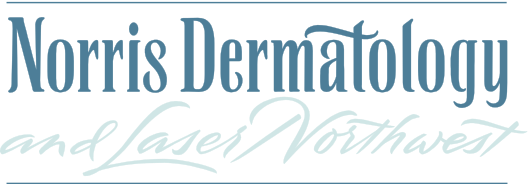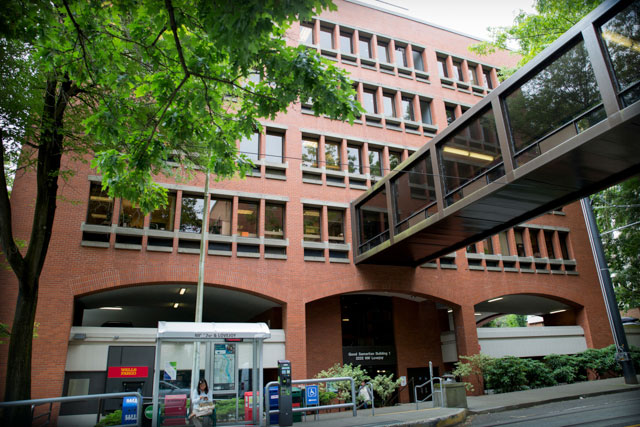Portland Acne Treatments
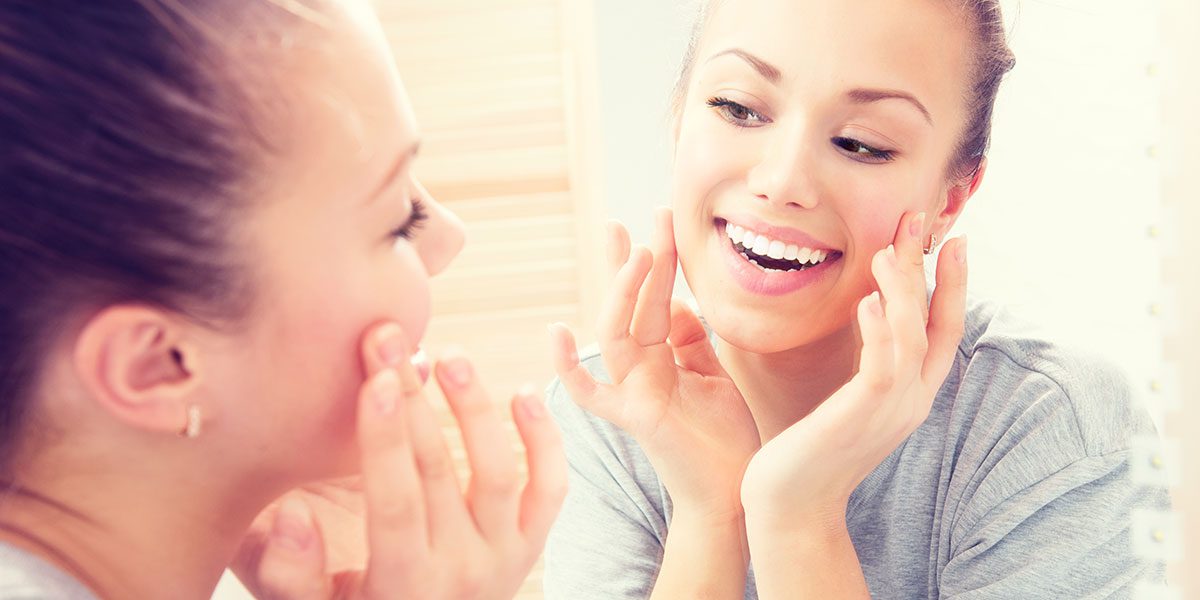
Skin Care Products for Treating Acne
Soaps that Help with Acne
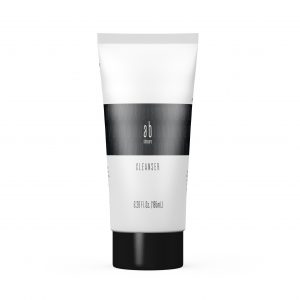 We recommend washing with a pH-balanced cleanser like Amanda Blakley Skincare Cleanser or Cetaphil Cleanser for Normal to Oily skin. Wash your face with your fingertips and massage gently for 30 seconds.
We recommend washing with a pH-balanced cleanser like Amanda Blakley Skincare Cleanser or Cetaphil Cleanser for Normal to Oily skin. Wash your face with your fingertips and massage gently for 30 seconds.
Sunscreens that Help with Acne
Alcohol based sunscreens are a clear spray. You apply the sunscreen to your face by spraying it on your hand and then applying it to your face. Alcohol-based sunscreens are less likely to cause acne. Lotions can worsen acne even if they are oil free. Sunscreen is important when treating acne, as many medications like Retin-A and Tetracycline increase your risk of sun sensitivity and sunburns.
Moisturizers for Acne
Rosewater in Glycerin is an old fashioned treatment that may soothe the skin after washing. Since acne medications can dry out your skin, moisturizers may worsen acne, so we usually recommend a glycerin based spritz (see photo below). In general, try to avoid all moisturizers if you have acne even if they are “oil-free”. Oil-free does not mean acne free! A good moisturizer will plump the skin, and reduce the appearance of wrinkles. However, moisturizers do not prevent winkles. Sunscreen will prevent wrinkles if you wear it daily.
Cosmetics that Help with Acne
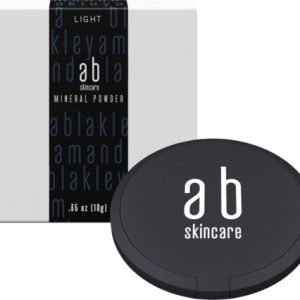 For women we recommend the use of mineral based powders (SPF 15, 20, 30) in place of liquid foundation and concealers. Concealers are high in oil and usually worsen acne. Liquid foundation will act like a moisturizer and may plug pores, create inflammation and ultimately worsen acne. Powder acts to cover acne but it also acts as a good physical sunscreen.
For women we recommend the use of mineral based powders (SPF 15, 20, 30) in place of liquid foundation and concealers. Concealers are high in oil and usually worsen acne. Liquid foundation will act like a moisturizer and may plug pores, create inflammation and ultimately worsen acne. Powder acts to cover acne but it also acts as a good physical sunscreen.
Acne Medications
Oral Doxycycline and Minocycline
Doxycycline and Minocycline are in the Tetracycline family of antibiotics. Doxycycline and Minocycline are used for their anti-inflammatory properties in the treatment of acne. Doxycycline and Minocycline may be taken with food. Doxycycline and Minocycline have less sun sensitivity especially with lower doses.
Low Dose Doxycycline
Sub microbial Doxycycline, 20-25mg two times a day, in the morning with breakfast and in the evening with dinner. This is a dose of Doxycycline that is below the level that will kill bacteria. We use these antibiotics for their anti-inflammatory properties – not their anti-bacterial properties. There are no effects on bacterial resistance. There are no effects on normal flora (yeast infections) or sun sensitivity at this dosing. We have patients cut a 100mg tablet into ¼’s — and take ¼ in the morning and ¼ in the evening. The pills should be taken with food – but avoid dairy products for an hour after taking the drug. The major risks for Tetracycline drugs include allergic reaction and sun sensitivity. Doxycycline has been reported in some cases to cause irritation of the esophagus. Minocycline has been reported to cause bone marrow suppression, drug induced lupus, DRESS syndrome, hyperpigmentation and pseudo tumor ceribri.
Topical creams: Tretinoin (Retin), Differin, Azelex, Finacea and Tazorac, Clindamycin and Benzoyl Peroxide
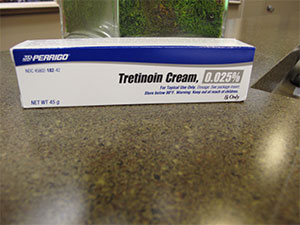 Tretinoin is a synthetic form of Vitamin-A. Differin and Azelex are not Vitamin A but have similar effects. These creams may be irritating but they are very important in the treatment of acne. They help normalize hair follicle cell growth; where acne is produced.
Tretinoin is a synthetic form of Vitamin-A. Differin and Azelex are not Vitamin A but have similar effects. These creams may be irritating but they are very important in the treatment of acne. They help normalize hair follicle cell growth; where acne is produced.
To avoid irritation, wash your face at night and wait at least 20-30 minutes before applying these creams. When you wash your face you wash the oil off and it takes 20-30 minutes for the oil to re-accumulate on your face. Your face will not feel dry in 20-30 minutes. But, if you experience irritation from your acne medications use the cream every other day or even every 3rd day. Slowly increase the usage to every day as your skin becomes more tolerant of the product. These medications will make your skin more light sensitive and increase your potential for sunburn. So remember to apply sunscreen. You also want to avoid waxing your face if you are on these medications.
Clindamycin and Benzoyl Peroxide: Clindamycin is a topical antibiotic. It is helpful in diminishing the overgrowth of bacteria found in acne. Apply clindamycin with 5 or 10 % Benzoyl Peroxide (ratio 1:1) to the face in the morning. The clindamycin/benzyl peroxide cream will vanish. This combination product should be left on your skin all day.
Spiranolactone
Spironolactone has been widely used for over 50 years to treat mildly elevated blood pressure and fluid retention. Over the years it was found to be highly effective in the treatment of certain hormonally related conditions in women, including:
- Adult acne
- Unwanted facial or body hair
- “Pattern” hair loss of the scalp
It is common for a woman to have two or even all three of these (hormonal) problems even in the presence of normal serum hormone levels. In fact, hormone levels are usually normal. The problem is not with how much hormone is made, but how much hormone is used at its destination; in this case the oil glands and hair follicles. If the oil glands and/or hair follicles are too sensitive to normal fluctuations in the hormones and they “overreact” to those fluctuations.
Two Important Points:
- Adult acne is NOT the same as teenage acne, and sometimes requires other treatment not used for younger patients.
- The same hormones can cause hair loss on the scalp and abnormal hair growth elsewhere. How can that be? Because different hair follicles have different hormone receptors.
Spironolactone does not change the hormone levels because hormone levels are not the problem. It works by preventing hormones from binding to your hair follicles and oil glands, thus blunting the unwanted effect. Since the hormone levels remain the same, hormone-associated side effects are avoided.
No drug is completely free of side effects, but in years of experience with this therapy, side effects have been quite rare, and those we have seen have been quite mild. Less than 5% have noticed irregular or frequent menstrual periods, which can be easily controlled with birth control pills or other methods. Breast tenderness, mood changes and fatigue are other possible side effects. The package insert also mentions reports of “tumors in laboratory animals”. This is outdated and misleading information. Spironolactone has been prescribed for over 50 years, with many people taking it daily for years at a time, yet there is no evidence that it has caused a single tumor in a human, even after many years of continuous treatment. The present consensus is that any such risk is negligible.
If an individual has normal blood pressure, spironolactone will not affect it. If you are being treated for high blood pressure presently, Spiranolactone may be a good alternative. This change should be coordinated your primary care physician.
Spironolactone should NOT be taken if you are pregnant or if you take drugs known as ACE inhibitors. Most people must take spironolactone regularly for a minimum of 4 months to have a beneficial effect. If it proves to be effective, you can count on remaining on spironolactone for 6 to 12 months.
While taking spironolactone, do not eat LARGE AMOUNTS of whole-grain cereals, chickpeas (hummus), bananas, potatoes, tomatoes, carrots, celery, orange or grapefruit juices, clear broths, or salt substitutes such as “Nu-salt”. REASONABLE AMOUNTS of any of these foods is not usually a problem.
The only adverse effect seen with any sort of regularity — is irregular menses, and that effect is easily rectified with oral contraceptives. Spironolactone is taken 25 mg by mouth 2 times a day.
Accutane (Isotretinoin) for the Treatment of Acne
Isotretinoin is a drug used in Portland in the treatment of acne. Considering Isotretinoin treatment is not the first line choice for acne treatment. Isotretinoin is considered for treatment when severe cystic acne has become unresponsive to systemic antibiotics, such as Doxycycline and Minocycline. When chosen, Isotretinoin has proven to be very effective in significantly clearing acne in most patients. It has been shown to cure up to 80% of patients who complete a full course. It has a great advantage over antibiotics, in that five months of treatment usually leads to marked clearing of the acne. The improvement in scarring and outbreaks continues to occur after the Isotretinoin treatment course of 20 weeks. There are however more side effects with Isotretinoin than with antibiotics. With proper medical supervision, these side effects can be controlled and eliminated and usually do not present much of a problem. The major side effect with Isotretinoin is that it causes severe birth defects in children born to women who are, or become pregnant, while taking Isotretinoin. However, there are no risks of birth defects to children born to women after stopping the Isotretinoin.
Chemical Peels for Acne Treatment
Chemical peels “peel” the top layers of the skin. The skin layers regenerate producing a smoother, softer, and more youthful skin texture. Chemical peels are useful for acne and acne scarring, but they can also be used for other skin conditions including brown spots, melasma, keratosis, and to decrease the signs of aging such as fine lines and wrinkles. Superficial chemical peels are safe in all types of skin, including individuals with darker skin-types. Downtime is usually minimal after these treatments. Two chemical peel methods are often used for acne scarring: A total face chemical peel is a generalized treatment and involves applying a Jessners solution or salicylic acid over the entire face. This technique is particularly useful for scars that have hyper-pigmented (darkened) the skin.
Photodynamic Therapy (PDT) for Acne Treatment
PDT is a revolutionary treatment for hard-to-treat acne and acne scarring. PDT has been used to treat acne for over 10 years. PDT combines light and a special light-activated solution (Levulan) that targets and destroys acne activity. This treatment also diminishes older acne scars, leaving your skin smoother.
This light-based treatment has been shown to affect both the acne-causing oil glands in the skin, as well as the P. acnes bacteria that contribute to the development of acne lesions. PDT has been reported to treat active acne, pimples, and black heads or white heads (comodones). PDT also decreases the frequency of acne breakouts, as well as improves the tone and texture of the skin while softening the appearance of acne scars.
Acne Scarring Treatment
Acne scars are a major problem that can be disfiguring and psychologically devastating to patients. Acne scarring affects patients of all ethnic backgrounds and all skin types in Portland. Even minor breakouts can result in scarring. Although it is a complex condition, treatments are available for acne scarring.
Acne scarring actually takes on different forms. Some patients will complain of persistent red or dark marks on their skin after the acne is resolved. Others might note textural changes in their skin, with rolled depressions or deep “ice pick” indentations on the skin surface. It is for this reason, that not all acne scarring patients can be treated in the same way. Therapies need to be individualized and each case must be carefully evaluated to provide the most effective solution for each unique patient situation. Because patients often present with different types of scarring, a combination of procedures may be required to maximize scar treatment outcomes.
It usually takes 6 – 8 weeks to see results with new acne medications. If you are not seeing results, be sure to call our office and we will discuss together, a different regimen.
You can learn more about acne treatments at American Academy of Dermatology.
